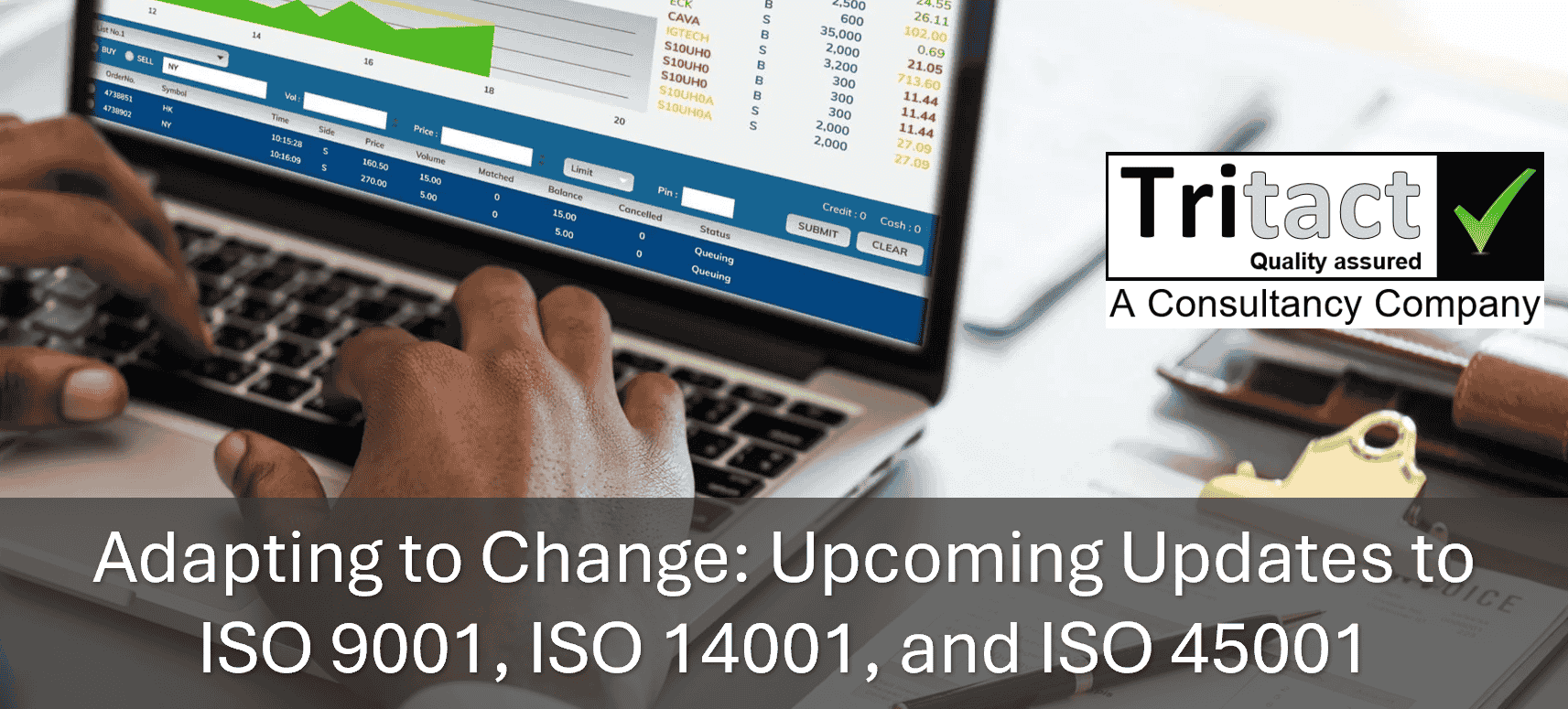Adapting to Change: Upcoming Updates to ISO 9001, 14001, and 45001


In a world where rapid change is the norm, businesses must address both operational efficiency and their environmental and societal responsibilities. ISO standards, renowned as global benchmarks of excellence, are evolving to meet these shifting demands. If your organisation holds or is pursuing ISO certifications, here’s an overview of key updates to ISO 9001, ISO 14001, and ISO 45001.
ISO 9001 – Incorporating Climate, Technology, and Ethics
ISO 9001 has long been the foundation for quality management, and its upcoming revisions* expand its focus to include modern concerns:
Climate Change Impact: Organisations must assess how climate risks, such as extreme weather or supply chain disruptions, could affect their operations.
Stakeholder Expectations: Greater emphasis will be placed on understanding and meeting client and partner demands for sustainability.
Ethics and Leadership: The revisions stress ethical practices and the cultivation of integrity within leadership teams.
Technology Adoption: Businesses are encouraged to adopt digital tools and data-driven approaches to enhance processes.
ISO 14001 – Elevating Environmental Responsibility
As a cornerstone of environmental management, ISO 14001 is undergoing updates** to address critical ecological challenges:
Life Cycle Thinking: The standard encourages organisations to evaluate the environmental impact of products and services across their entire life cycle.
Climate Adaptation: Businesses must assess climate risks and apply mitigation measures.
Global Sustainability Alignment: The updates will strengthen links to international frameworks like the UN Sustainable Development Goals (SDGs).
ISO 45001 – Merging Safety, Health, and Environmental Priorities
ISO 45001, the standard for occupational health and safety, is evolving*** to embrace a more integrated approach:
Proactive Risk Management: Organisations will be encouraged to identify potential hazards early and prevent incidents.
Health, Safety, and Environmental Integration: Updates will harmonise safety measures with environmental practices for a cohesive management system.
Employee Well-being: A stronger emphasis will be placed on addressing mental health and overall employee well-being.
Why These Updates Matter
These changes go beyond compliance to promote resilience, relevance, and competitiveness in a world prioritising sustainability and social responsibility. Climate change, ethical expectations, and advancing technology are reshaping business landscapes, and aligning with these ISO revisions ensures organisations remain at the forefront.
How to Prepare Your Organisation
1. Review Existing Systems: Evaluate how current practices align with the new standards.
2. Engage Stakeholders: Involve employees, clients, and suppliers in identifying areas for growth.
3. Transition Strategically: Begin updating documentation and processes for certification or recertification.
4. Seek Professional Guidance: Work with Tritact Consulting experts to navigate the changes effectively.
Embracing the Future
The updates to ISO 9001, 14001, and 45001 present an opportunity to innovate and lead while fostering a sustainable and ethical approach to business. Preparing now ensures your organisation remains resilient and competitive, meeting the demands of stakeholders and contributing to a better future.
*The amendment ISO 9001:2015/Amd 1:2024, released earlier this year, integrates climate risks into quality management systems. A fully revised standard is expected by September 2026.
**The amendment **ISO 14001:2015/Amd 1:2024, published in February, sets the stage for a comprehensive revision by late 2025.
***The amendment ISO 45001:2018/Amd 1:2024, released earlier this year, aligns these updates with the timelines for ISO 14001 revisions.







